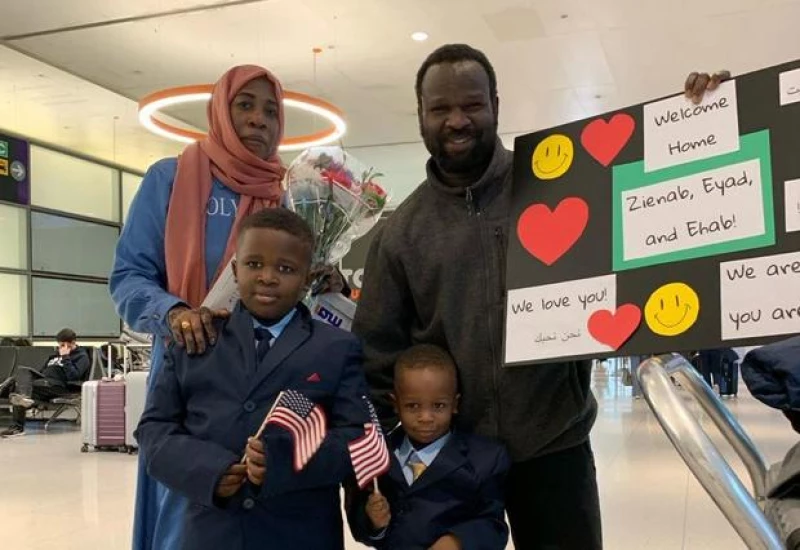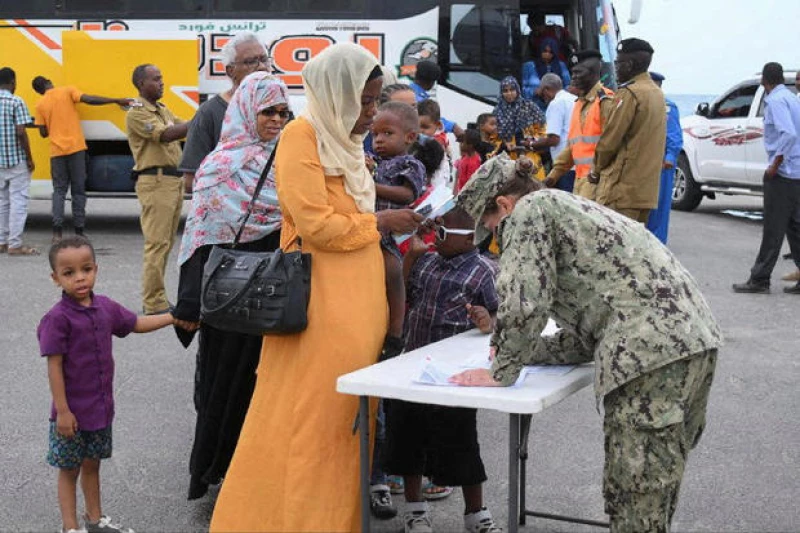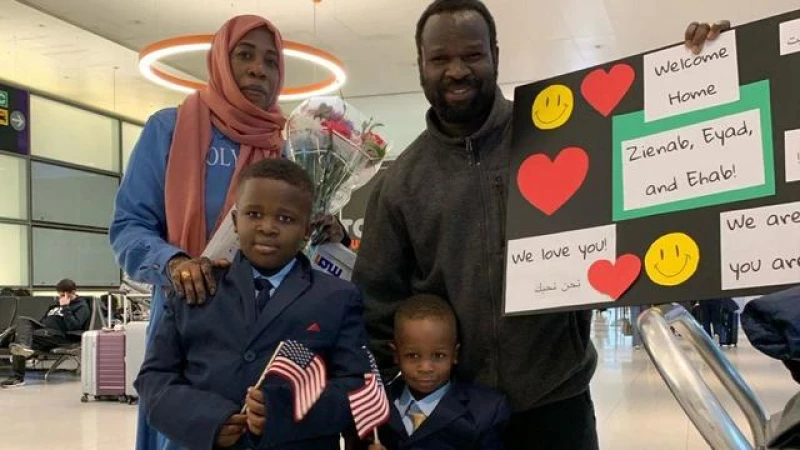"Tears were running down my face," El-Fadel Arbab shared with CBS News as he described the emotional reunion with his wife and two young sons. "I just wanted to cry from all the happiness."
After enduring 332 days filled with worry and anticipation due to the ongoing war in Sudan, the Sudanese-American's efforts to reunite with his family have finally paid off.
On a day in late March, Arbab stood in the arrivals hall at Boston's Logan International Airport, clutching a poster adorned with red hearts and yellow smiley faces that he had crafted himself. The poster carried messages in both English and Arabic: "We love you!" and "We are happy you are here!"
As the security doors parted, 3-year-old Ehab and 7-year-old Eyad, dressed in blue suits and ties, stepped foot in the United States for the first time. Zienab Abaker, donning a peach-colored head covering, beamed as she embraced her husband.
A nightmare, followed by "a dream come true"
Arbab's family fled Sudan's embattled capital city of Khartoum with a United Nations convoy just two weeks after war broke out. They made it to the Port of Sudan, on the country's east coast, joining millions of others trying to escape the bloodshed as rival military and paramilitary commanders battled for power over the country.
A U.S. Navy ship ferried Abaker and her boys, along with 300 other refugees, east across the Red Sea to the Port of Jeddah, in Saudi Arabia. But by then, her husband Arbab, working in Portland, Maine, had lost contact with his family.
"No WiFi. No phone. We were researching if any news or anything," he said.
Then, last sprint, he saw a photograph of his wife and boys featured in an article on CBSNews.com, part of a series of reports as our team sailed from Jeddah to Port Sudan and then back again on a Saudi naval ship ferrying refugees. The image, taken by a Reuters photographer, showed Abaker and the boys undergoing screening by a U.S. soldier at Port Sudan. It was proof they had safely made it to the coast, at least.
"I was just in tears," he said. "It was like a dream come true."

He expected his wife and sons to arrive within weeks, so he quickly rented a two-bedroom apartment and furnished it with donations from the community where he's lived for the past two decades.
A Family's Journey: From Sudan to Saudi Arabia to the U.S.
After fleeing war-torn Sudan, Arbab and his family found themselves in Saudi Arabia, facing hurdles to enter the U.S.
Arbab, a U.S. citizen, worked tirelessly to reunite his family, juggling immigration processes and supporting them from afar.
His wife, not a U.S. citizen, was stuck in Saudi Arabia, unable to join her family in Maine.
Despite the challenges, Arbab remained determined, showcasing his family photo to officials and working multiple jobs to provide for them.
Meanwhile, his wife Abaker, isolated in a hotel, cared for their sons alone, fearing deportation back to Sudan.
After enduring months of uncertainty and fear, the family finally received the news they had been waiting for.
"The only happiness was when she received her passport. They say you get the visa and you're going to the United States and your husband. Then she felt like she could be happy," he recalled.
Arbab said his family were the first Sudanese nationals to make it out of their limbo in Saudi Arabia and reach the U.S., for which he's extremely grateful. But he added that "dozens and dozens" of people remain stuck in similar circumstances.
War traps millions in an "apocalyptic catastrophe"
There has been no sign of the vicious conflict between the Sudanese Armed Forces and the rival Rapid Support Forces paramilitary group easing since it erupted on April 15, 2023. Before turning against each other, the rival generals who led those well-armed groups staged a coup together against a fragile transitional government that had been trying to steer Sudan toward democracy.
Since they fell out, their war has killed 14,000 men, women and children, according to the United Nations. More than 8.2 million people have been displaced from their homes, with those who've been able fleeing abroad, and countless others seeking any respite they can find in a country with little access to food, running water or health care.
"The situation in Khartoum has deteriorated into a battlefield over the past year, with millions of Sudanese civilians trapped and essentially cut off," stated Alan Boswell, who serves as the Horn of Africa project director at the International Crisis Group think tank.
Expressing grave concern, Boswell warned, "Millions of Sudanese are on the brink of famine and may face starvation this year. This is the kind of catastrophic event that appears to belong only in history books."
On the solemn one-year mark of Sudan's conflict, an international conference was convened by France to garner financial support for the war-ravaged nation from Western and Gulf countries. You can find more information about the conference here.
Global Attention Shifts, Leaving Aid Efforts in Jeopardy
Boswell, speaking to CBS News during the conference, emphasized the critical need for both funding and security in Sudan, highlighting the severe deficiencies in both areas. Despite the U.N.'s assessment that $2.7 billion is urgently required to support the Sudanese population, only a meager $166 million has been raised thus far—a mere 6% of the total amount needed.
"Ideally, we would hear about commitments of hundreds of millions of dollars more for humanitarian aid in Sudan. However, a significant obstacle has been the Sudanese military's obstruction of food supplies to regions outside of their control, which encompasses a large portion of the country," Boswell explained.

Additional $2.1 Billion Pledged to Sudan
French President Emmanuel Macron revealed on Monday that an extra $2.1 billion in aid has been promised to Sudan. However, no details were provided regarding the identity of the donors or when the funds would be put to use on the ground.
Speaking from his residence in Portland, Arbab expressed his observation to CBS News that as long as new conflicts arise, powerful Western nations will continue to shift their attention to the latest crisis, leaving previous issues behind.
"The global focus on the Sudan war seemed to fade rapidly after the evacuation of their citizens," added Boswell. He cautioned that the conflict in Sudan could have broader implications, as the nation is surrounded by other unstable states also grappling with internal strife, posing a significant risk of spreading instability.







